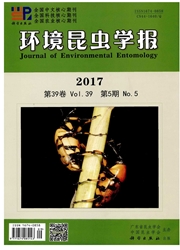

 中文摘要:
中文摘要:
【背景】目前,烟粉虱已成为世界性的入侵害虫,对我国的农业生产造成了严重损失。由于烟粉虱抗药性增长迅速,以非化学防治为主的综合防治措施,成为控制烟粉虱的重要手段。近年来,茉莉酸作为与损伤相关的植物激素和信号分子,已被发现广泛存在于植物体内,外施茉莉酸可激活植物的防御系统,诱导其产生次生防御物质,从而影响包括烟粉虱在内的多种害虫的生长发育、繁殖与存活等。【方法】在温度(26±1)℃、相对湿度(75±5)%、光照L:D=14:10的条件下,通过在番茄根部和叶部外施茉莉酸,研究茉莉酸诱导的番茄上烟粉虱的生长发育和繁殖等生物学特性。【结果】在茉莉酸诱导的番茄上,烟粉虱的发育历期以叶部诱导(shootJA.induced,SJA)的番茄上最长,平均历期为27.3d,与对照组(control,CON)番茄上的25.7d和根部诱导(root JA-induced,RJA)番茄上的25.8d差异显著;在SJA和CON番茄上,烟粉虱的世代存活率分别为47.17%和55.57%,而在RJA番茄上烟粉虱的存活率为81.13%,后者与前两者差异达到显著水平;烟粉虱成虫在CON、RJA和SJA番茄上的平均寿命分别为25.1、23.6和18.7d,即在JA诱导的番茄上烟粉虱成虫的平均寿命明显缩短;在产卵量方面,对照番茄上发育的烟粉虱平均单雌产卵量最大,为132.8粒,SJA番茄上发育的烟粉虱平均单雌产卵量最小,为107.9粒,两者差异显著;RJA番茄上发育的烟粉虱平均单雌产卵量为118.1粒,与前两者无显著差异。【结论与意义】利用茉莉酸诱导番茄可对烟粉虱的发育、繁殖和存活产生不同程度的影响,且诱导部位不同产生的影响也有很大差异。本结果对探索烟粉虱等刺吸式害虫的防治新策略有一定的参考价值。
 英文摘要:
英文摘要:
[ Background] The sweetpotato whitefly, Bemisia tabaci, is a globally distributed pest, which has caused serious damage to a wide range of crops in China. Due to its rapid increase of chemical resistance, the development of non-chemical control meas- ures of B. tabaci is the key strategy in the future. We examined the effect on B. tabaci of jasmonic acid (JA) , a ubiquitous regula- tor of herbivore induced wound responses, that can induce several direct and indirect defence responses, and thus can block the de- velopment, survival and ability to damage of insect pest including whitefly. [ Method] Tomato Solanum lycopersicum plant, one of the preferred host plants of B. tabaci were induced by jasmonic acid (JA) on shoot and root under laboratory conditions, and the effects of JA induction on the development, survival and reproduction of B. tabaci were investigated. [ Result ] Among shoot JA-induced (SJA), root JA-induced (RJA) and control (CON) plants, the longest developmental period of B. tabaci immatures was found on SJA plants with 27.3 days, which was significantly longer than those on CON (25.8 days) or RJA plants (25.7 days). The lowest survivorship of B. tabaci immatures was 47.17% on SJA plants, followed by that on CON plants (55.57%), and both of them were significantly lower than that on RJA (81.13%). The average longevity of B. tabaci adults on the CON, RJA and SJA plants were 25.1, 23.6, 18.7 days, respectively, and the average longevities on SJA and CON plants were remarkedly different from each oth- er. Moreover, the averaged fecundity of B. tabaci was 132.8 eggs per female from CON plants, while on RJA and SJA plants, fecundity were 118.1 and 107.9 eggs per female; these differences were significant between CON and SJA plants. [ Conclusion and significance ] Our results indicated that the induction of JA on plants may have different effects on the development, survival and reproduction of a pest, profoundly modified by the plant organs where the JA treatment was
 同期刊论文项目
同期刊论文项目
 同项目期刊论文
同项目期刊论文
 Genetic identity of the Bemisia tabaci species complex and association with high cotton leaf curl di
Genetic identity of the Bemisia tabaci species complex and association with high cotton leaf curl di Phylogenetic analysis of Bemisia tabaci (Hemiptera: Aleyrodidae) populations from cotton plants in P
Phylogenetic analysis of Bemisia tabaci (Hemiptera: Aleyrodidae) populations from cotton plants in P Prevalence of Endosymbionts in Bemisia tabaci Populations and Their In Vivo Sensitivity to Antibioti
Prevalence of Endosymbionts in Bemisia tabaci Populations and Their In Vivo Sensitivity to Antibioti 期刊信息
期刊信息
